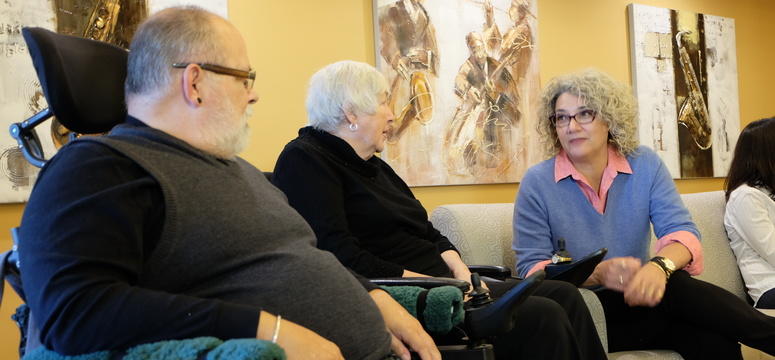
Lorraine Venturato, right, associate professor with residents of St. Marguerite Manor.
Lynda Sea, Faculty of Nursing
March 23, 2017

Lorraine Venturato, right, associate professor with residents of St. Marguerite Manor.
Lynda Sea, Faculty of Nursing
With a greying population and an increase in chronic disease and frailty, more Canadians can expect to live their final years and ultimately die in long-term aged care settings.
What that means to Lorraine Venturato, associate professor and Faculty of Nursing Chair in Gerontology, is that the health-care system needs to focus more energy on improving end-of-life conditions for those living and dying in long-term care.
Venturato is the provincial lead on a national, CIHR-funded study exploring a novel palliative approach in long-term care.
“We have many evidence-informed aspects of end-of-life care,” she says. “This study is really about combining them into a unified approach in order to evaluate real-world application and feasibility within the Canadian long-term care context.”
Study exemplifies faculty’s focus on applying research outcomes into practice and policy
The faculty’s ability to take research outcomes forward into practice and policy underpins the three research priorities in the new strategic plan: advancing nursing education, child and family mental health, and living well with chronic conditions.
Venturato is convinced the results from this study, which falls under the last pillar, will play a key role in developing transformative care and improving health outcomes and service delivery for people living with chronic conditions.
End-of-life care not just about clinical decisions, but relationships and support
“At the end of the day, we hope that residents and families have a better experience at end of life, and that staff and services are better prepared to work with these people,” she says. “As researchers and educators, we can ensure our findings reach our students as future providers of this care.
“There are many components to end-of-life care. It’s not just about the clinical decisions we make, but also the relationships and support that people have,” adds Venturato. “For most of us, it’s the last thing we get to do well. Providing quality care for people in long-term care at the end of their lives can make a huge difference, and knowledge and compassion can go a long way in this area.”
Learn more about Leading the Pursuit of Nursing Excellence, the Faculty of Nursing's 2017-2020 strategic plan.